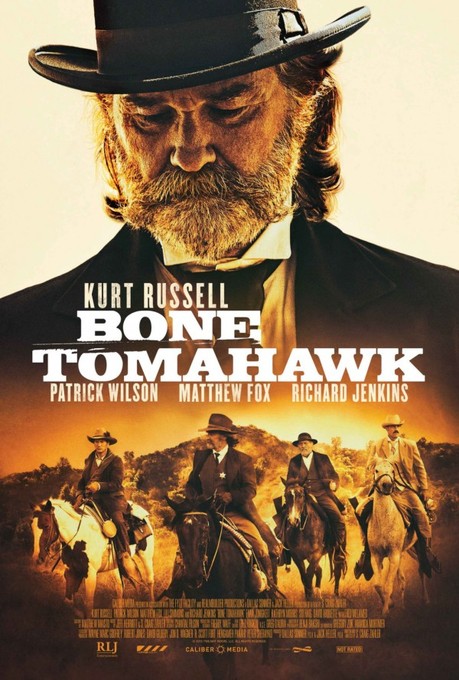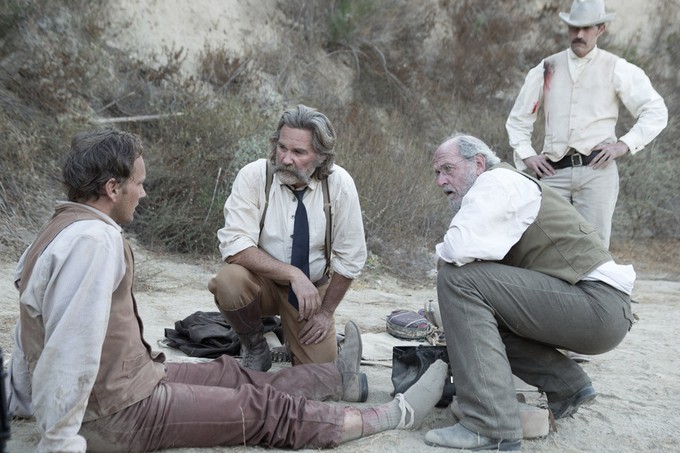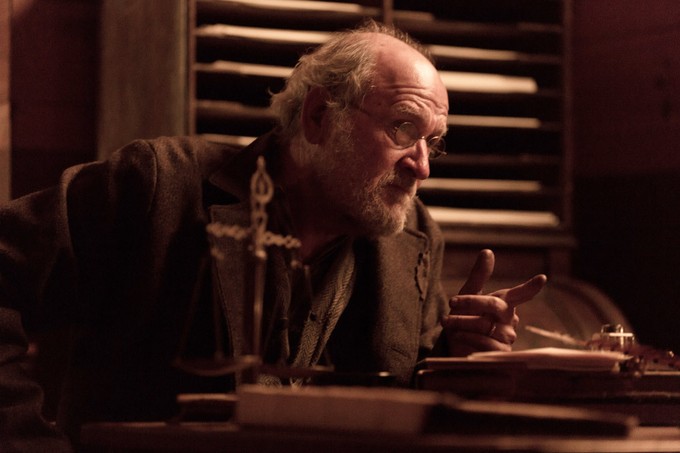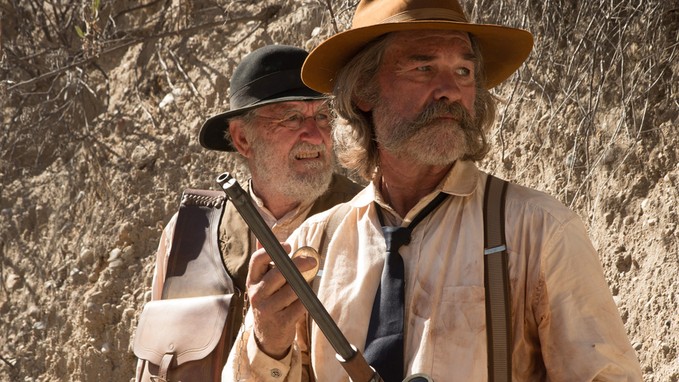Ahoy, squirts! Quint here. Bone Tomahawk is legit, you guys. It's a real deal western with some ridiculously violent horror moments that happens to have the added bonus of featuring some of the best working actors that roam the earth.
Yes, there are cannibals being creepy. Yes, there is Kurt Russell being awesome. Yes, there is Richard Jenkins doing his “I'm real good at acting” thing. There's not a whole lot of movies out there like this being made anymore, so you got to support them when they come around.
The film premiered during Fantastic Fest and I got the chance to sit down with a few of the people involved with making the movie, starting with writer/director S. Craig Zahler.
It was immediately apparent that he knew his shit when it comes to movies, as you'll see in the below chat. We talk about the origins of this project, how he gathered his amazing cast and what kind of influences played a large part in the creation of the story.
Enjoy!

Quint: Sometimes you go into a movie expecting it to be something specific and it's not that. That usually backfires, but I had that experience on Bone Tomahawk and it actually made me appreciate it more. The only thing I'd heard about this movie was it was Kurt Russell vs. cannibals in the old west, but this is a real deal western, a men-on-a-mission movie that happens to have some horrific stuff in it.
S. Craig Zahler: Yeah, that's basically all the advertising that has been going on about this movie since the beginning, which I have strongly and almost violently pushed against. They're pushing it as a hardcore horror movie. I'm a huge horror fan, but it's a western. It's a western that has horror scenes in it that are strong, but it's a western.
Quint: I've seen people try to set horror elements in this era before and they always miss the mark by making the focus the genre elements. What you do here fits perfectly because the horror element is in the level of violence you show, which almost has a Sam Peckinpah/Wild Bunch brutality to it.
S. Craig Zahler: Thank you. And I adore horror. I cringe when someone makes a horror movie and they start soft-selling it as a thriller. There are a lot of phrases that are triggers for me, like “elevated genre.” That's my least favorite phrase of all time. If it's good it's good.
Most films are genre. Whether it's a genre most people put in a ghetto is another thing. I adore horror, but if I made a horror movie, bottom line: I'd want to scare you at all times. The bottom line for a western, for me, is really, really different. Those were my priorities here.
Quint: And what is that bottom line?
S. Craig Zahler: I have a pretty strict definition of what a western is. To me, almost all of my favorite westerns can be classified this way, and the other four westerns I've written, a couple of screenplays and two novels, are certainly this... it's an adventure story where the frontier is a moral and physical crucible for the main characters. If there's no adventure it's missing something.
I know everybody likes Deadwood. I didn't. More than not really liking it for a bunch of reasons that aren't really worth getting in to, but the main thing was I felt it was missing the adventure component. It could have been set in 1880s England. It could have been this Dickensian thing in this squalid, urban environment.
That physical crucible, the lawlessness in society is not so much the environment you're in, but something that's inside you and something you impose upon other people in the wild. That's what a western is, whether it's The Wild Bunch, Tall T, Man of the West...
Quint: And the Leone films, too.
S. Craig Zahler: Oh, yeah. Once Upon A Time In The West, it doesn't get better than that. It's one of my couple favorite movies ever. That stuff is always there, there's that adventure component. If it's just a period piece set in a town and some people are wearing hats and some other dudes are saying “ain't” it's not fully there for me.
Which isn't to say (there aren't exceptions). The Gunfighter is a really good western that Gregory Peck and Henry King made and that's more or less just the story of a guy in a town and his past catching up to him.
I know that horror movies are a lot easier to sell than westerns, as I saw with the many years it took to get this made and my other westerns that haven't yet been made and how difficult it was to get my western novels published, but if it was simply a horror movie I'd just want people to be frightened at all times. I adore horror movies, it's just not what I've done here.
Quint: The Men-On-A-Mission aspect of the movie was my favorite element. My favorite film of all time is Jaws, so I couldn't help but compare the two. This is Brody, Quint and Hooper going after the shark. This is the Guns of Navarone. Each person has strengths and weaknesses... this is a very long-winded way of me asking how you decided to make the focus a Searchers or Jaws or Guns of Navarone style men-on-a-mission story.

S. Craig Zahler: The producer of this movie, Dallas Sonnier, is my manager. When this movie went into production it was entirely financed by him and foreign interests. We had not a dollar of American money from a single company. Part of it was because people don't believe the western is marketable. Also, when you see it... that's the script I wrote. We shot every page. I wasn't really interested in changing it. There were certainly ways to make it more commercial.
I was going to do a horror movie that was called Flesh Beneath the Concrete. I was going to pay for it out of pocket and I was watching a ton of micro-budgeted indie horror. In particular, I really enjoyed the works of Brian Paulin, who did Fetus and Bone Sickness and Blood Pigs. I was going to do something like that.
So, I had a meeting with him and my agent and they said, “Could you do a low budget western?” I said, “Something to pay for out of pocket? I don't think so.” Dallas said, “Could you do Wraiths of the Broken Land,” which is my second western novel and it's incredibly nasty. Like Bone Tomahawk times 10. They asked if I could do that as a movie. I said no, because the story's too long. It would be four movies or a television show. But I said I could write another story that is a rescue/men-on-a-mission sort of thing and that's where Bone Tomahawk came from.
There are specific choices in the script that I made because I needed to figure stuff out. Like, I knew that with the budget we were originally shooting for we'd only have horses for so many days. So, I'm making creative decisions even before I've written (the script) because I'm practical. My background was I was a DP shooting indie stuff. I knew how to make your $50,000 feature shot on Super 16mm, so I had some concept on what to do.
Obviously things changed once we started getting Kurt Russell and Richard Jenkins aboard, but I knew this idea meant the character dynamics were very important. With the exception of maybe the science-fiction I write, the characters are the heart of everything I do.
It's kind of tough going into something like and saying “And it's going to be an ensemble. It's not just one dude running around doing stuff.” I wanted to have that character growth. I write strong characters even though Screenwriting 101 and all the generic garbage that comes up tells you that all your characters have to have an arc and (be molded by) very clear experiences. For me, I tend to write very strong characters, so they're not going through experiences and dramatically changing their views because of it, but they are changing their relationships with one another. That is something I'm interested in exploring.
Quint: True. Look at one of the most revered action movies of all time: Die Hard. What's John McClane's big arc? It's more about seeing a strong guy get everything thrown at him and seeing how he comes out on top.
S. Craig Zahler: And you get the best action movie ever made. You get a little arc with Bonnie Bedelia when she takes off the watch. You get your clear symbolic “she's moving away from the money” aspect...
Quint: Weirdly, the character with the biggest arc in Die Hard is Al because he is able to pull his gun at the end of the movie.
S. Craig Zahler: Yeah, he gets an arc. I've never read a screenwriting magazine or How To, but I know that's something some people do. If it makes sense for the story have them change. I've certainly written stories where people change dramatically by the end... a lot of times not for the better, if I'm writing it, but if you're writing strong characters sometimes that person's strength and resolution to withstand obstacles... Certainly Patrick Wilson, the performer, had a lot to deal with in this movie. That's a long list of impediments and obstacles for him and he was a champion.
Quint: I imagine as an actor you read something like “my character starts the movie with a broken leg” and think “That's going to suck, but look at how much I have to work with now.” He's not just walking from A to B in this story.
S. Craig Zahler: Nope, he's dealing with an impediment from his first shot.
Quint: We have to talk about how you got Kurt in the movie.
S. Craig Zahler: Right.
Quint: From a creative standpoint you must have been over the moon because he's such an icon, but I also imagine having someone that good also attracted other talent and helped guarantee the movie would actually come together. Is that what happened? He came on and other actors followed?
S. Craig Zahler: The first actor who came onboard was Peter Sarsgaard. I'd gone to him for the role of Arthur, which Patrick Wilson ended up playing. He read it and liked it. We had a meeting and he came onboard. He was attached for a while. He's known for being a particularly critical person, so when he liked the script his representatives, Michael Cooper in particular, at CAA were impressed. “If he likes it, this script could be good.”
We wanted to go to Kurt Russell for Sheriff Hunt. So, when we got the stamp of approval from Peter Sarsgaard it went to Kurt. Kurt read it really quickly and we had a talk and I assuaged some of his fears as far as me being a first time director. I worked as a cinematographer and I directed some theater, so I knew what a movie set was like and I knew what a movie set was like when there was no money and you just had to shoot shoot shoot. We did Bone Tomahawk in 21 days.
He came onboard then and I was certainly very happy because at that point I figured the likelihood of this movie getting made probably quadrupled. That aspect of it was amazing, but it's also just Kurt Russell, man.
I will point out that my favorite performance of his, and I told him, is in Dark Blue. It's a movie that not many people have seen or mentioned, but he agreed that it's certainly up there if not at the top. What Kurt has... and I have a cast of really talented actors, but something distinctly great about Kurt, and I'm not just going to say it's his voice because that's too simple... he has a very good voice, but there are certain actors, Burt Lancaster is one, Randolph Scott is one, Richard Boone from Have Gun Will Travel is one, Robert Stack from The Untouchables TV series is another, who have certain cadences in their voice where they can read lines and it doesn't seem artificial at all. You hear them deliver the line and you wonder if anyone on the planet could have delivered it as well.
There are 15 lines like that in this movie. He's doing the right interior work for his performance, but this is just kind of an extra thing. There are people who have a cadence that makes their line readings so distinctly that person... the parody example of this is Christopher Walken. At some point it dissolved into self-parody and it got away from him.
Quint: There are a few iconic actors like that. John Wayne, Humphrey Bogart, James Cagney...
S. Craig Zahler: Yeah. Bogart's a great example. I should add him to the list. He's a particularly good one. In terms of nuance, I don't know if there are finer actors than Richard Jenkins. He's one of the most nuanced performers in existence.
Quint: I have to say... I knew he was in the movie, but it took me five minutes to realize the character I was watching was him.

S. Craig Zahler: You are not the first person to say that. One of the sound people working on the movie worked for two days and called someone over and said, “Holy shit! Is that Richard Jenkins?!?” He just disappears in the role.
Quint: He's playing one of my favorite archetypes in these kinds of westerns. If this was made in the '50s or '60s Walter Brennan would have played this character. I loved that he took on that very specific character, but didn't do it as a stereotype. That's kind of what I love about the movie on the whole. You play with a lot of archetypes I like, both within horror and the western, but you're not just copying it. I've seen a lot of movies and some even here at Fantastic Fest where you can tell the people who made them love movies, but are just kind of tracing them instead of adding their voice to it. That is absolutely not the case here.
S. Craig Zahler: Thank you. When you're setting up a group of four guys there's going to be a dynamic there, but every one of these guys has surprising moments. I spent a lot of time on the history of these characters. I had a lot of really good conversations with Matthew Fox. I'm so happy with his work in this. A lot of people have been stunned by just how different a performance this is from him. I always thought he was a very real performer who always went deep.
On a show like Lost, I really liked the first few seasons of it and then had some problems after that, in terms of the writing, but you watch someone like Matthew Fox go through, what, ten directors and fifteen writers handling the same character and he's still centered doing that real work. There's a point where you realize the quality control on that character in that show is Matthew Fox. It's not that all these directors landed in the same place and all these writers landed in the same place. It's him, so I knew he was going to be very real.
We had an uncanny moment. I was dealing with the props guy, Eddie Grisco, who is fantastic, and we were going through our western gear. We were looking through guns and I found a gun I thought was really good for Brooder. A few days later, Eddie Grisco comes back to me and says, “What do you think about this one? It's like the one that you picked out, but it's a little different.” I said, “That one's even better!”
When I showed Matthew the gun I picked out for him, he looked down at the gun and said “I have this exact gun at home.” It's like a gun from 1900!
In terms of serendipity, we had a lot of really good conversations on that character. It was really a pleasure to work with him. I think that's going to be a discussed character.
Quint: I wouldn't say his character is an easy one to get wrong because he is so well-written, but his dramatic pay-off doesn't come until the end. We don't get a full sense of his character until 2/3rds of the way through the movie. With the other leads you know right up front who they are...
S. Craig Zahler: Yeah, and you don't know where he's coming from. Exactly.
Quint: It was another pleasant surprise. He knocked it out of the park and I'm glad because I agreed to do these interviews before the I saw the movie and sometimes that doesn't work out so well!
S. Craig Zahler: Oh, I had a legendary one... Thing is, I'm a strange interview because I say some stuff I shouldn't, so I don't do a lot of them, but I remember I had a meeting set with Lee Daniels and I had a private screening set up for me to see Precious the day before. I saw that movie and I said, “This is one of the couple worst movies of the last 10 years!” I'm not a liar, so I could point out a couple things I thought were decent about it, but so much of it was, I thought, inconsistently directed, a lot of the performances were terrible, it was monotonously mean... The Lenny Kravitz scenes! At least he was trying to be kind of subtle, but the movie was just hitting the same note the whole time.
Anyways, I was just trying not to talk about his movie, but he knew I had seen it the previous day and it was so incredibly awkward. I'm sure you've had some incredible ones.
Quint: I learned a long, long time ago that I don't volunteer an opinion if it's negative, but if I'm asked my opinion I'll be honest. There was one pretty epic one that I did at Sundance with Brian Cox. He had a couple movies at the festival and one of them was called Red, which I didn't care much for. I went to the interview and he knew I had just come from the screening and he asked me what I thought. I wasn't mean about it, but I told him I had some issues with the movie and you could tell there was some turmoil behind the scenes (they switched directors during production). There's a great picture I have of me in the middle of telling him all this and he just looks annoyed, not looking at him. I could tell it wasn't going well, so I tried to point out some of the stuff that worked and that I thought his performance was solid and he simply said, “I'm a producer on that movie” and went quiet. In my head I was like, “Great start!” Anyway, this wasn't one of those.
S. Craig Zahler: I'm glad!
Quint: Thank you for your time, man.
S. Craig Zahler: Thank you.

The film can be seen today! Go seek it out if you like good things!
-Eric Vespe
”Quint”
quint@aintitcool.com
Follow Me On Twitter

